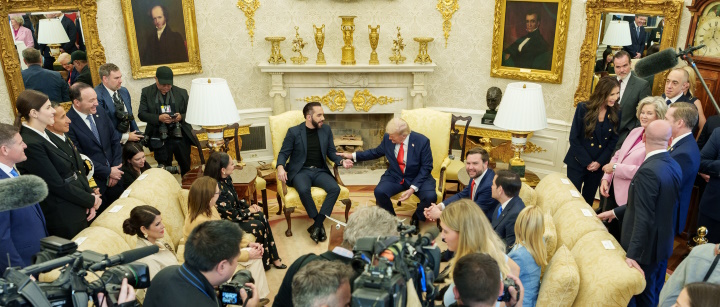Listen to the article
Supreme Court Orders Trump Administration to Return Wrongfully Deported Immigrant
The U.S. Supreme Court ruled on April 10 that the Trump administration must comply with a lower court’s order to facilitate the release of Kilmar Armando Abrego Garcia, an immigrant wrongfully deported to El Salvador without a hearing. The case has ignited a fierce debate over constitutional protections for noncitizens and the limits of executive power in immigration matters.
Abrego Garcia was among more than 250 immigrants deported to El Salvador on March 15. The administration has acknowledged his deportation resulted from an “administrative error” but has resisted bringing him back, arguing U.S. agencies lack authority to extract someone from foreign custody.
“That’s up to El Salvador, if they want to return him. That’s not up to us,” Attorney General Pam Bondi said during an April 14 Oval Office meeting between President Trump and Salvadoran President Nayib Bukele. At the same meeting, Secretary of State Marco Rubio emphasized, “The foreign policy of the United States is conducted by the President of the United States, not by a court.”
Legal scholars Erwin Chemerinsky and Laurence H. Tribe offered a more pointed assessment in a New York Times opinion piece, writing that the administration is “using this case to establish a truly chilling proposition: that no one can stop the Trump administration from imprisoning any people it wants anywhere else in the world.”
The case highlights tensions over due process protections for immigrants. Border czar Tom Homan suggested to Axios that immigration agents should be the “principal” judges of gang affiliations, and that those deemed enemies “don’t have the same level of due process.” Similarly, Trump’s homeland security adviser Stephen Miller posted on social media: “If you illegally invaded our country the only ‘process’ you are entitled to is deportation.”
Legal experts, however, emphasize that constitutional protections apply universally within U.S. borders. “The thing about due process is that it either applies to everyone present in the United States or it applies to no one,” said Amy Grenier of the American Immigration Lawyers Association. She notes the Constitution uses the word “person,” not “citizen,” making these rights applicable to everyone regardless of immigration status.
The Fifth and Fourteenth Amendments establish that no person shall “be deprived of life, liberty, or property, without due process of law.” This includes the right to know charges against you and to contest them before removal.
Abrego Garcia’s case exemplifies these principles in action. He fled to the United States in 2012 to escape gang violence from Barrio 18 in El Salvador, which had targeted his family’s business. Living with his U.S. citizen brother in Maryland, he was arrested in 2019 while seeking day labor work and faced deportation proceedings.
Although the Department of Homeland Security alleged he was affiliated with MS-13 – a claim Abrego Garcia consistently denied – an immigration judge ultimately granted him “withholding of removal.” This protection, while not offering a path to permanent residence or citizenship, prevented his deportation to El Salvador due to credible persecution fears. The government did not appeal this ruling.
Yet on March 12, 2024, ICE officers arrested Abrego Garcia without a warrant, telling him only that his “status had changed.” He was deported three days later without seeing a judge, despite his protected status.
U.S. District Court Judge Paula Xinis described his detention as “wholly lawless,” noting “there were no legal grounds whatsoever for his arrest, detention, or removal.” The Supreme Court has now upheld Xinis’ order that the government should facilitate his release and restore his previous legal status.
President Bukele has resisted releasing Abrego Garcia, suggesting he is a “terrorist,” while the Trump administration maintains that his detention “is no longer a matter of the United States’ confinement, but a matter belonging to the government of El Salvador.”
The case has broader implications for immigration policy under the Trump administration, which has taken steps to expand expedited removal processes and required all foreign nationals present in the U.S. longer than 30 days to register with the government.
As legal challenges continue, the Supreme Court has instructed the District Court to clarify its order with “due regard for the deference owed to the Executive Branch in the conduct of foreign affairs,” while requiring the federal government to explain what steps it has taken toward Abrego Garcia’s return.
Fact Checker
Verify the accuracy of this article using The Disinformation Commission analysis and real-time sources.




7 Comments
Interesting that the administration is resisting bringing Abrego Garcia back, even after acknowledging the ‘administrative error.’ Seems like a troubling disregard for the court’s authority and the immigrant’s rights.
This case seems to raise serious due process concerns. Deporting someone without a proper hearing is concerning, regardless of immigration status. I hope the administration complies with the court order to facilitate Abrego Garcia’s return.
This case underscores the importance of checks and balances, with the courts stepping in to uphold the Constitution even when the executive branch resists. I’ll be following this closely to see how it unfolds.
Curious to hear more legal analysis on the limits of executive power in immigration matters versus the role of the courts. This case seems to highlight an ongoing tension between the branches of government.
Deporting someone without a hearing is a serious breach of due process. I hope this case leads to greater safeguards to prevent such errors and protect the rights of immigrants, even those facing deportation.
The administration’s stance that it’s up to El Salvador to return Abrego Garcia is troubling. As the article notes, the deportation was an admitted ‘administrative error’ – the US has a responsibility to rectify that.
While the president conducts foreign policy, the courts play a critical role in protecting constitutional rights, including for non-citizens. I’m glad the Supreme Court stepped in to address this apparent violation of due process.